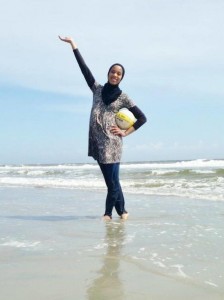By Rose Hamid, Guest Column, Charlotte Observer
“Why are you wearing that thing on your head?” is a question I’ve been asked many times, and I’m happy for the opportunity to explain. As a Muslim woman I am required to cover my head and dress (and behave) modestly.
The Quran gives women specific guidance on how to dress: “… and do not display their beauty except what is apparent, and they should place their head coverings over their bosoms … they should cast their outer garments over their persons (when in public)…”
People have different interpretations of what that means, but most Muslims believe it means to cover everything but the face and hands and to wear loose clothing that does not show the shape of the body.

The concept is referred to as “wearing hijab,” but the word hijab is also used for the scarf that covers the hair.
From the time of puberty, women are required to wear hijab when they are around men who are not close relatives. My hijab comes off as soon as I get home (and when I’m around my girlfriends).
The reality is that the majority of Muslim women DO NOT wear hijab. As with any religion, there is a wide spectrum of adherence to the tenets of one’s faith. Judgment should not be made about women who do or do not cover. Some very devout women I know do not cover. Conversely, there are women who do cover, but who don’t understand much about their faith.
The Quran says, “Let there be no compulsion in religion.” Therefore, women should not be forced to wear hijab. A woman’s decision to cover is between her and God and should be made out of a desire to please him, and not just because it’s what her family or society expects.
Hijab styles are largely dictated by the culture/society a woman finds herself in and by her own personal style. Muslim women care about fashion to the same degree that non-Muslim women do. Some prefer to wear comfortable clothes every day, while others wear the latest fashions. There is a whole industry dedicated to Muslim women’s clothing, with Indonesia being the leader in the industry.
Muslim Americans have a variety of choices for buying their clothes. Some shop online or at an assortment of ethnic stores. People seem disappointed when I tell them I get my clothes from Target or Marshalls. I look for loose-fitting, lightweight clothing that I can wear creatively, and I have a closet full of hijabs to match any outfit. Although the “dress-over-pants” trend is catching on in Hollywood, Muslim women have been rockin’ that look for a long time.
One Charlotte-based clothing option is Hijabican.com, owned by Kawthar Suleiman, which features Western-style clothes suitable for Muslim women such as those sun-dresses and maxi skirts that are now in vogue. Another local company is Muslim Diva, owned by Hadiyah Weeks, a designer who creates fashion for Muslim women.
To me, wearing hijab isn’t just a fashion statement; it’s an outward demonstration of my desire to follow God’s commands. It feels like a protection from the dangers of this world and the next. It means my value and my worth to society should not be based on my sexuality or my physical attributes, but instead on the type of person I am, how devout I am, and how I treat others.
When a woman chooses to wear hijab at the beach, at the gym or on the job, she is not oppressed; she is liberated by her faith.
Article originally published on the Charlotte Observer
